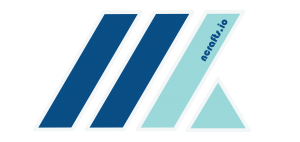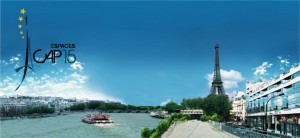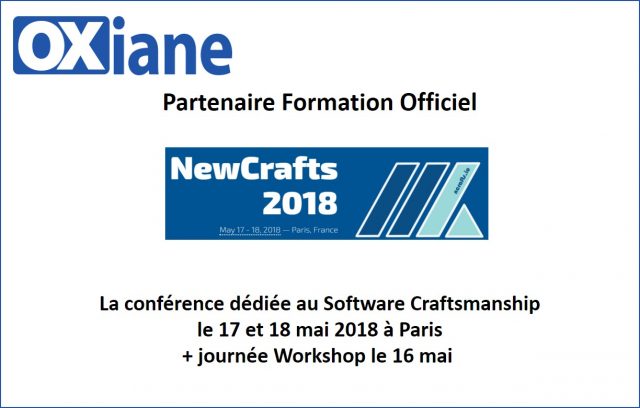OXiane partenaire NewCrafts 2018
 est partenaire formation NewCrafts 2018
est partenaire formation NewCrafts 2018
La Conférence Européenne dédiée au Software Craftsmanship
les 17 et 18 2018 à Paris
+ journée Workshops le 16 mai

Conçu par les développeurs pour les développeurs :
Venez vous perfectionner avec les dernières techniques du développement applicatif fondées sur les valeurs du Software Craftsmanship.
NewCrafts est le rendez-vous indépendant et international des développeurs professionnels passionnés autour des technologies, pratiques et architectures modernes.
Pour cette quatrième édition nous accueillons de nouveaux speakers, restez à l’affût pour connaitre la liste.
Faite par des développeurs et pour les développeurs, NewCrafts est la première conférence du genre en France et compte bien s’imposer comme une référence en Europe.
 Speakers
Speakers
 ADRIAN BOLBOACA Adrian is a programmer, trainer and coach. His passion is helping teams produce high quality software, both on technical and organizational sides. He worked in organizations in many industries like energy, e-commerce, ERP/CRM, embedded software, banking, etc. During the last period he traveled a lot around Europe to learn from local communities and user groups and to teach and facilitate hands-on activities. Adrian is a supporter of Deliberate Practice, experiments, and experiential learning. In 2016 he published a book about hosting and facilitating a coderetreat, a one-day deliberate practice concept for programming https://leanpub.com/coderetreat. Adrian plans to develop more the concept of Evolutionary Design through hands-on workshops, live coding sessions, articles and at least one book on this topic. | SANDRO MANCUSOSandro Mancuso is a software craftsman, author of Software Craftsmanship: Professionalism Pragmatism Pride, and co-founder of the London Software Craftsmanship Community (LSCC)
|
 KEVLIN HENNEYCo-author of A Pattern Language for Distributed Computing Kevlin is an independent consultant and trainer based in the UK. His development interests are in patterns, programming, practice, and process. He has been a columnist for various magazines and websites, including Better Software, The Register, Java Report and the C/C++ Users Journal. Kevlin is co-author of A Pattern Language for Distributed Computing and On Patterns and Pattern Languages, two volumes in the Pattern-Oriented Software Architecture series. He is also an editor of 97 Things Every Programmer Should Know. | NAT PRYCENat Pryce is a co-author of Growing Object-Oriented Software Guided by Tests. An early adopter of XP, he has written or contributed to several open source libraries and tools that support TDD and was one of the founding organizers of the London XP Day conference. He works programmer, architect, trainer, and consultant in a variety of industries, including e-commerce, media, telecoms, finance, retail and marketing communications. He has delivered business-critical systems that range from embedded devices to large compute farms supporting global business.
|
BODIL STOKKEFunctional Programming Prophet Born into an aristocratic Russian-German family, Bodil traveled widely around the Soviet Union as a child. Largely self-educated, she developed an interest in computer science during her teenage years. According to her later claims, in 1989 she embarked on a series of world travels, visiting Europe, the Americas, and India. She alleged that during this period she encountered a group of mathematical adepts, the “Haskell Language and Library Committee,” who sent her to Glasgow, Scotland, where they trained her to develop her powers of category theory. Both contemporary critics and later biographers have argued that some or all of these foreign visits were fictitious, and that she spent this period writing JavaScript. | |
 JESSICA KERRDeveloper, @Atomist. Panelist, @greaterthancode. Jessica Kerr “speaks with the authority of an experienced software engineer and the infectious enthusiasm of a 10-year-old telling you about magic.” After ten years in Java she discovered the big wider world of programming through F#, Scala, Clojure, and now Elm. She speaks about functional programming, property-based testing, and juggling complexity. In real life, she works on the data pipeline at Stripe and raises two daughters in St. Louis, MO. Find her @jessitron or blog.jessitron.com |  STEVE FREEMANSteve Freeman, author of Growing Object Oriented Software, Guided by Tests (Addison-Wesley), was a pioneer of Agile software development in the UK. He has developed software in many organisations from small vendors to multinational institutions. Previously, he has worked in research labs and software houses, earned a PhD, written shrink-wrap applications for IBM, and taught at University College London. Steve now works as an independent and is a Distinguished Consultant with Zuhlke Engineering in London.
|

Communauté :
Plus de 400 développeurs réunis durant 2 jours, une belle occasion de rencontrer de nouvelles personnes et d’échanger avec les speakers
 Les Workshops :
Les Workshops :
Living Documentation Step-by-Step | ||
Mihály Csíkszentmihályi defines flow state as an “optimal state of consciousness where we feel our best and perform our best.” We’ve likely all experienced this flow state individually at various times, but how do we achieve this at the team level? In this hands-on advanced workshop, you’ll explore how to apply Lean principles of flow to your everyday development work. We’ll take a practical approach: participants will be working on real–world problems. We won’t be covering the basics of Scrum, Kanban or any frameworks etc. There will be no easy answers. Instead, you’ll learn how to ask the right questions, and how to evaluate different models of team flow. It doesn’t matter if your team does Scrum, Kanban, or something else, we’ll cover practical techniques you can take back and apply immediately to your team situation. Learning Goals This workshop is designed for experienced agile developers who want to move beyond basic Kanban, Scrum and task boards to a deeper understanding of how to apply Lean theory and practices in their context. We’ll cover:
There will be individual and group exercises. We’ll also be working in pairs, using the application Flow as a teaching tool to visualize and measure the presence and impact of these hidden queues on team productivity. You’ll review actual work timelines for several teams to see a radically clear view of team progress and areas where work is getting stuck. You’ll leave with a deeper understanding of lean principles, and a checklist of practical steps to confront and manage queues in your own team’s work. Participant Requirements You are an experienced software developer with solid experience on agile teams and desire to learn and grow. Bring your laptop to share with a partner for our pair-based discovery sessions using Flow. It’s recommended to read “The Principles of Product Development Flow” (Reinertsen, 2009), but not essential.
| If you prefer coding over writing documentation, then you’ll love Living Documentation! A Living Documentation changes at the same pace as software design and development, from establishment of business goals to capturing domain knowledge, creating architecture, designing software and coding. It builds on top of BDD and DDD, but it also has its own key principles and novels ways to dramatically improve your documentation at minimal extra cost by using well-crafted artifacts and judicious automation. This workshop from Cyrille Martraire, the author of the book “Living Documentation” (Addison-Wesley Professional), will guide you on how to implement the approach in your projects. Even if you haven’t read the book, this workshop is the right place to learn the main elements of a Living Documentation, step by step through a provided sample Java code base. You will learn:
What you will need A working Java 8 environment with Maven for two attendees The sample project (only using basic Java) will be available from github or from a USB key
| Sonic Pi is a powerful new kind of synthesiser designed to be simple enough for anybody to use. By expressing your ideas in simple lines of code you can quickly create your own sonic compositions and before you know it you’re modifying the code as it’s playing to create your own live performances. In this kickstarter workshop, we learn, jam, explore, share and perform with each other all through the beautiful creative medium of code. Use Sonic Pi to trigger synth patches, samples, studio FX and live loops. No prior knowledge of coding is required – just an open mind to new ways of creating and manipulating sounds. Please bring along a laptop and some headphones with Sonic Pi pre-installed. Simply head to http://sonic-pi.net and download the appropriate version for your operating system (Mac, Windows or Linux).
|
 Tarif
Tarif
NewCrafts : 640 €HT par personne
Combo Workshop + Newcrafts : 950 €HT
 Lieu
Lieu
| Newcrafts : | |||
 | NewCap (anciennement Cap 15) 13 Quai De Grenelle 75015 Paris |






